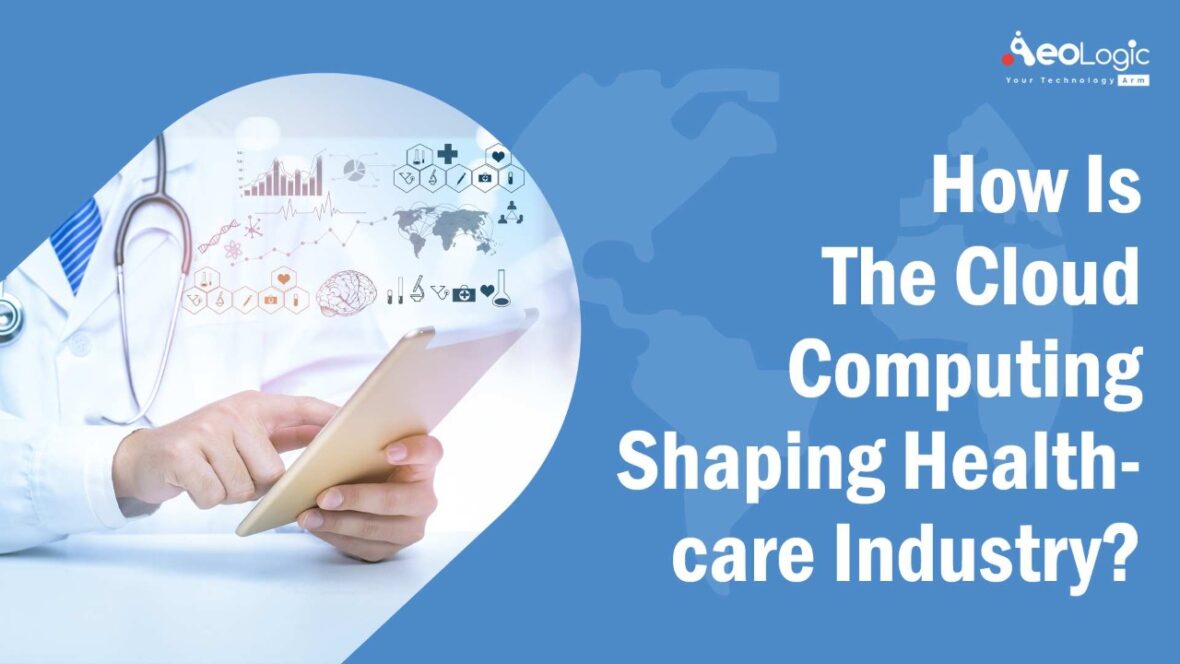The Healthcare sector is one of the prominent segments that are benefiting from cloud computing. The firm established by the healthcare industry is obviously facing several challenges in its day-to-day functioning. Cloud-based solutions which offer flexibility in terms of infrastructure, budget, and technology adoption will give a great boost to the entire health care ecosystem. So, in this blog, we will look at how is cloud computing shaping healthcare industry?
Let’s begin!
When we consider cloud computing in healthcare, we don’t only mean the patient engagement platform. In fact, the cloud is a multipurpose technology that can transform everything from data acquisition to data storage.
What is Cloud Computing in Healthcare?
Cloud computing is one of the most transformative technologies in the healthcare industry today. Cloud computing is the delivery of computing services—including servers, storage, databases, networking, software, analytics, and intelligence—over the Internet (“the cloud”) to offer faster innovation, flexible resources, and economies of scale.
In healthcare, cloud services can be used in a number of ways, from storing and sharing medical images to powering population health management programs. One of the most common applications of cloud computing in healthcare is electronic health records (EHRs). According to a report from the Office of the National Coordinator for Health Information Technology (ONC), approximately 80 % of hospitals and 50 % of physician practices in the United States were using some form of cloud-based EHR as of 2016.
The use of cloud-based EHRs can have a number of benefits for healthcare organizations. It includes improved patient care, reduced costs, and increased efficiency. In addition, patients can also benefit from having their health information stored in the cloud. They can access and participate in their own health data.
Also Read: How the Internet of Things is Revolutionizing Healthcare
The Benefits of Cloud Computing in the Healthcare Industry
The healthcare industry is in the midst of a major transformation. The use of cloud computing is one of the driving forces behind this change. Cloud computing is transforming the way how healthcare organizations store, access, and deliver patient care.
There are many benefits of using cloud computing in healthcare. One of the most important benefits is that it can help to reduce costs. Healthcare organizations can use cloud-based applications and services to reduce their IT costs. Cloud computing can also help to improve patient care by providing access to new and innovative applications and services.
Another benefit of using cloud computing in healthcare is that it can help to improve patient safety. By storing data in the cloud, healthcare organizations can ensure that it is always available and can be accessed by authorized personnel only. This can help to prevent errors and mistakes that could lead to patient harm.
Cloud computing is also helping to change the way that healthcare is delivered. By making information and applications available online, patients can receive care from anywhere in the world. This provides them with more flexibility and choice when it comes to their care.
Overall, cloud computing is having a positive impact on the healthcare industry. It is helping to reduce costs.
Types of Cloud Computing in Healthcare
Healthcare uses three forms of cloud computing:
- Public,
- Private, and
- Hybrid.
Public cloud computing is when a healthcare organization uses a service that is provided by a third-party company, such as Amazon Web Services or Microsoft Azure.
Private cloud computing is when a healthcare organization uses its own servers and software to provide services to its patients and staff.
Hybrid cloud computing is when a healthcare organization uses both public and private cloud services.
Just a Few ways in which the Cloud is Shaping Healthcare
Cloud computing is a great way to solve some of the biggest challenges in healthcare. Here are a few reasons why:
More affordable: Cloud computing means you’re not paying for physical servers, which makes it cheaper than traditional IT infrastructure.
Easy to manage: Cloud computing allows you to have more control over your data security, allowing you to use more secure methods for storing your information.
Flexible: You can scale up and down as needed so that you don’t have to worry about having too much power or bandwidth available at any given time.
It’s accessible anywhere: You can use cloud services from anywhere in the world. So you don’t have to worry about being stuck with old technology or having few resources when it’s time to upgrade or switch.
Also Read: Technology’s Role in Repairing a Broken Healthcare System
How Cloud Computing Technology Helpful in the Healthcare Industry
The healthcare industry is under constant pressure to improve patient care while reducing costs. One way that healthcare organizations are meeting these challenges is by implementing cloud computing technology.
Cloud computing can provide healthcare organizations with many benefits, including increased storage capacity, lower IT costs, and improved access to data and applications. In addition, the cloud can help improve patient care by providing doctors and other healthcare professionals with easier access to patient records and other information.
While there are many benefits to using the cloud in healthcare, there are also some challenges that need to be considered. One of the biggest challenges is ensuring that sensitive patient data is secure. Another challenge is ensuring that the cloud infrastructure is reliable and scalable enough to meet the needs of the healthcare industry. Even with these challenges, the cloud is having a big effect on the healthcare industry.
Also Read: How Will Technology Revolutionize the Healthcare Industry?
Bottom Lines
The healthcare industry is evolving rapidly and cloud computing is playing a major role in shaping its future. By providing a flexible, scalable, and cost-effective platform for storing and processing data, the cloud enables healthcare organizations to improve patient care, drive down costs and unlock new insights from their data. As the industry adopts cloud technologies, we’ll see more revolutionary transformations.
If your company doesn’t have enough experts, you can hire a healthcare app development company to help you adopt cloud solutions and solve technical problems.
Aeologic technology is a great place to start!






